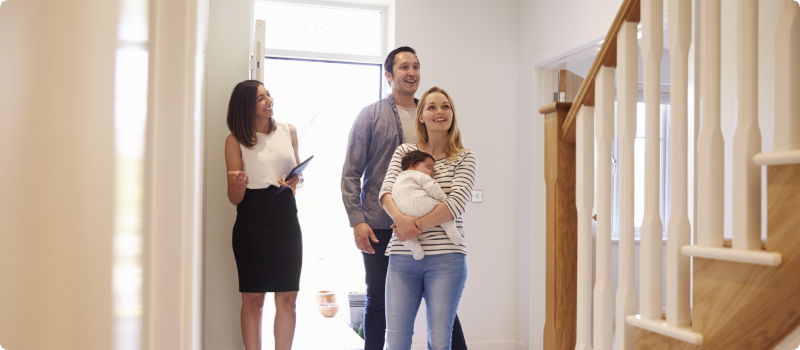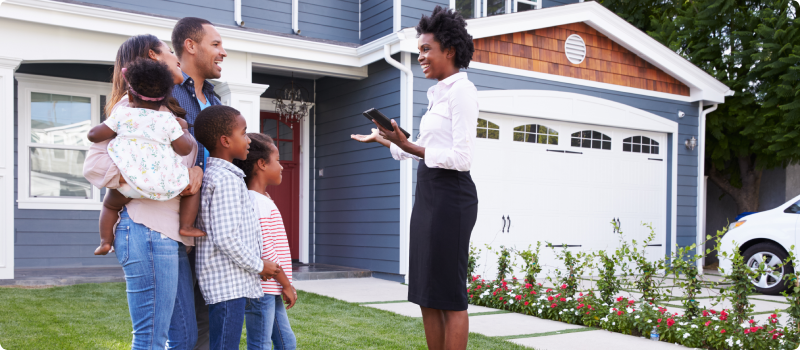Homeowners quick cost estimate
Find out how much homeowners insurance can cost based on your new address. Get a quote today.
Updated January 3, 2025 . AmFam Team
Buying a new house can be an exciting experience. It’s your family’s new home, and the place where new projects and new memories will be made. There’s a lot to keep track of though, especially if you’re busy selling your current house while buying your new one.
It can seem like a difficult balancing act. But the good news is there are different options out there — one for each lifestyle — like the choice to either buy or sell your home first, and then work on the other option as time allows.
To help cut down on the confusion or challenges you may be facing, here are things to consider when deciding whether to sell and buy your house at the same time.
Find out how much homeowners insurance can cost based on your new address. Get a quote today.
Yes, you can sell and buy a house at the same time. Although it can be tricky to pull off, it is possible. You’ll only need to keep a close eye on your finances and your calendar. Before you try buying and selling at the same time, it’s important to first understand what your options are and then make the call on what works best for you.
A key advantage of buying your new home before you’ve sold your old one is that you’ll have more time to focus on the upcoming move. You won’t have to worry as much about moving all of your stuff out of your previous house before the new owners move in.
It also means you probably won’t need to find a temporary storage solution. This can be very appealing if you must relocate immediately for a new job and you don’t have time to sell your home before moving.
However, buying your new home first can make qualifying for a new mortgage more challenging because your debt-to-income ratio may be higher. If you do qualify for a new mortgage, then you may have two to juggle until your current home sells.
This alone can also make selling your old house more difficult. Paying for two mortgages can really add up, not to mention maintenance costs for both homes. Remember, you’ll also have to carefully budget for the eventual moving expenses. If money’s tight, you may want to consider alternatives.
If buying your new house before selling your old one is looking like a viable option, here are some tips that can help you pull it off:
Coming up with a down payment can be difficult if you buy your home before selling, so plan to save for one accordingly. Mortgage companies typically recommend you put at least 20 percent down, but the savings needed for a down payment depends on your budget.
Work with your mortgage broker or lender before you start looking for a new home so they can put a cap on how much they’re lending you, which can help you budget your spending limit. A bridge loan may also help in this scenario, so consider asking your lender about one.
A contingent offer is when an offer on a new home is made, but the final sale isn’t accepted until specific criteria are met. In this case, you could make a contingent offer where the offer you’ve placed on the new home is “contingent,” pending the sale of your old home — usually within a specific timeframe. That way you may not be locked into buying your new home if your old one doesn’t sell in time.
Similar to a contingent offer, asking the seller for a later closing date may give you more time to check off tasks related to selling your house. An example can be more time is needed for your lender to approve your loan. Requesting a later closing date may be a little inconvenient to the seller, but it’s not uncommon, so don’t feel too bad about asking.
If you need to move into your new house ASAP, consider leasing your old home to a temporary tenant. There are a variety of short-term rental platforms you can choose from, with Airbnb (Opens in a new tab) and Vrbo (Opens in a new tab) among the most popular. Renting out your old house means you can make money that can help pay for the mortgage and maintenance while you search for a buyer. Keep in mind though you’ll need to have your old home furnished if you choose to make it available to rent, so go this route only if you’re able to pull it off.

If you’ve got a fair amount of equity in your current home, selling your house first can be a good idea. You’ll be able to use the money earned from the sale to help pay for your new home. This is a big advantage if you’re worried about your finances or concerned budgeting is an issue. You’ll also have more flexibility and less costs to worry about — like paying for two mortgages.
If you do choose this route though, the biggest disadvantage is not immediately having a new house. That means you’ll have to find temporary housing while you shop for a home. For some this isn’t a big deal, as crashing on a friend's couch or staying in a parent’s guest room may be easy alternatives.
But for those with big families, it’s clearly going to be a challenge. You have to consider where you’ll store all your personal belongings until you move into your new house. And that can be stressful. If you think you’ll be able to navigate those straights, selling before buying may be the right choice for you.
If selling your current house first works best for you, the following tips may help the selling process go smoothly. They may also help prepare you for temporarily living without a permanent new home.
A real estate agent can be a key ally in selling your home quickly and effectively. Talk to at least a few and research online whether or not previous home buyers had a positive experience with that agent. If the agent is well received and trustworthy, they may be able to help you sell and offer advice on finding your new home as soon as possible.
Try to arrange for a tentative place to stay before your home is listed. You’ll have one less thing to worry about once it’s sold. Find somewhere that works best for your budget and your family, whether that means staying in a hotel room, or even your parent’s place for a few weeks.
Another common alternative is the “lease-back agreement” which allows you to rent your home from the new owner for a predetermined period of time after closing. If you have the time and budget for a lease-back, you can still live in your old home with your family while you continue the search for a new house.
A little preparation can make selling your home first less of a hassle. Research what kind of new home you want, including where the house is located, its features and community, so that when your old house sells you can hopefully find that property of your dreams right away.
Getting pre-approved on a loan or finding a mortgage lender ahead of selling can also help expedite the buying process.

Now that you better understand the alternatives, you may still want to buy and sell at the same time. By doing so, you benefit from some of the advantages of the other options. For instance, you won’t have to worry about finding a temporary living situation. You still may have some challenges to face too — like having enough time and money. Prioritize these considerations to hopefully make buying and selling at the same time go as smoothly as possible:
Ask this question before you decide to buy and sell at the same time: Is it in my budget? Remember, you may have to make two mortgage payments at the same time (your old house and new house), and all the related expenses for both properties like maintenance and taxes. If you’re comfortable moving a lot of money around at once, you can make it happen.
The more time you have the better, so be sure to plan out far in advance. Establish a timeline where you align moving out of your old house and then moving into your new one, but make sure your schedule has lots of flexibility. You’ll want to be able to move into your new home even if the moving process takes longer or shorter than expected.
It’s also key to consider the current housing market climate. If the market is really hot and homes are selling quickly, finding that dream home may take longer. Competitive markets can also push home prices higher, too. Remember to keep an eye on market trends and try to buy at the right time.
Chances are you’ll need help pulling this off. Reach out to family, friends who’ve bought and sold recently and of course — your real estate agent. They’re all great resources who can help manage stress and set achievable goals during the moving process.
Whether you decide to buy first, sell first or both at the same time, it’s important to make sure your home is protected from the unexpected. American Family’s agents are here to provide you coverage and support during this transition, including covering your old home and insuring your new one. They can also help you save money when you bundle your coverages together.
Learn more about how to protect you homes — old and new — with American Family Insurance’s homeowners coverage.
This article is for informational purposes only and based on information that is widely available. We do not make any guarantees or promise any results based on this information. This information does not, and is not intended to, constitute legal or financial advice. You should contact a professional for advice specific to your situation. We are not responsible for the content of any third-party sites that may be linked in this article.
JSS component is missing React implementation. See the developer console for more information.